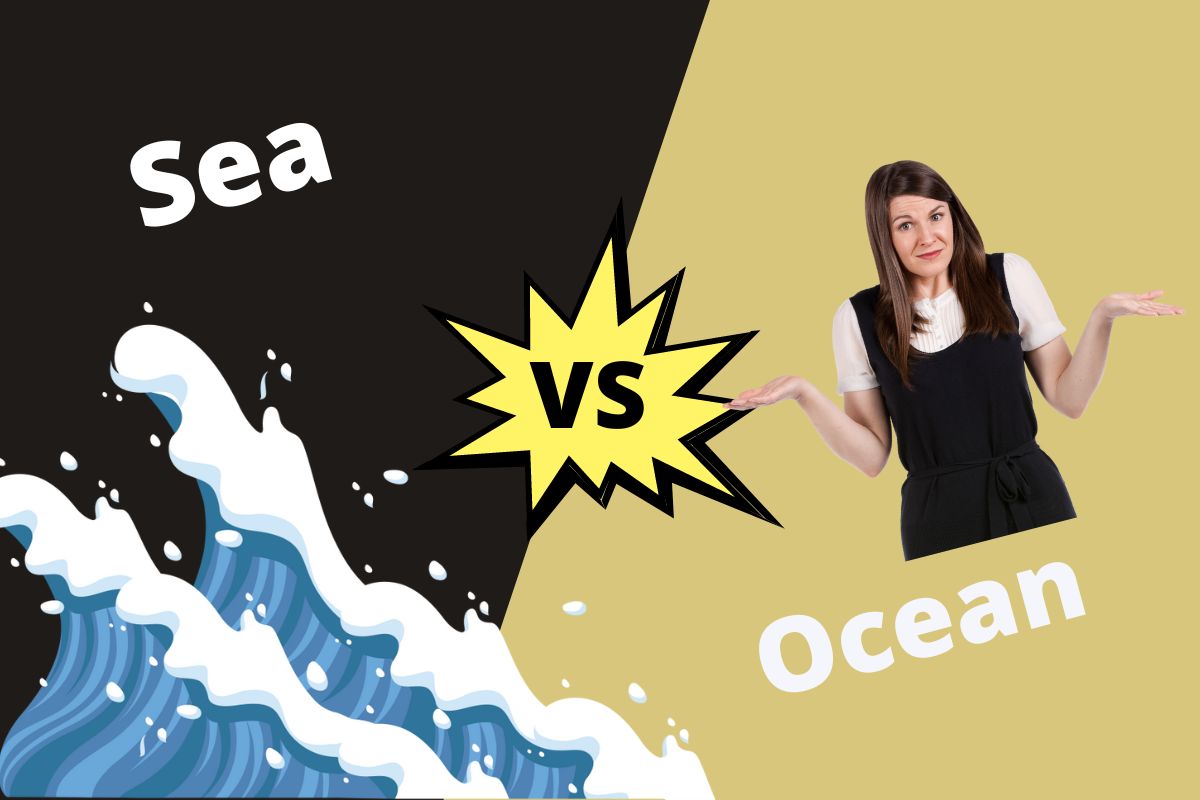The primary difference between sea and ocean is the size. Seas are typically smaller than oceans and are enclosed by land.
Table of Contents
What is a Sea?
A sea is a division of these waters marked by land limits. This means that seas are partially enclosed by land.
Seas are regions of the ocean wholly or partially bordered by land, typically smaller land masses rather than entire continents.

What is an Ocean?
The immense expanse of salty water that makes up about three-fourths of the Earth’s surface is the ocean. You can think of the continents as islands in one large, limitless sea of the ocean.
This large area, often called global ocean or world ocean, is in portions, depending on the distance between each region and the continents.
The largest oceans are the Pacific and the Atlantic, which are further split into the North and South Atlantic and North and South Pacific, respectively. As a result, there are seven oceans if you add up these divides.

Difference Between Sea and Ocean
Oceans are large pools of water that make up around 70% of the planet’s surface. The four oceans of the globe form one massive, linked body of water.
Seas are the smaller areas of water that are partially encircled by land. More than 50 smaller seas dispersed over the globe.
Sea vs Ocean: A Comparison
| Sea | vs | Ocean |
| Seas are much smaller bodies | Size | Roughly 70% of the surface of the globe is covered by the ocean and are large bodies of water. |
| Seas are typically near land | Location | Oceans are not always near a land mass |
| More rich marine life | Marine Life | Oceanic life is scarce and often consists of bacteria, shrimp, and minute planktons. |
| The Caribbean Sea is the deepest, with a depth of 6900 meters | Depth | The Pacific Ocean, which is approximately 10,000 meters deep, and the Arctic Ocean, which is about 5600 meters deep, are the two deepest oceans |
| No influence on the climate | Climate Influence | Ocean currents, which carry warm or cold air to various coastal locations, significantly impact Earth’s climate. |
Oceans are large pools of water that make up around 70% of the planet’s surface. The four oceans of the globe form one massive, linked body of water.
Seas are the smaller areas of water that are partially encircled by land. More than 50 smaller seas dispersed over the globe.
Area
71% of the Earth’s crust comprises oceans, which also hold 97% of the global water. The largest sea, the Mediterranean Sea, has a surface of 1,144,800 square miles, and the Pacific Ocean is the largest, with a surface area of about 64,186,000 square miles.
Even the Arctic Ocean, the smallest ocean in the world, is bigger than the Mediterranean.
Marine Life
Marine life is abundant and diverse in both oceans and seas. The depth and range from the coast significantly influence the quantity and richness of the animals and plants that reside there.
Due to sunlight’s ability to reach deeper into the seawater and enable photosynthesis, there is a significant amount of marine life in the sea.
Part of the ocean deeper and farther from shore will contain fewer fundamental living creatures like bacteria, tiny plankton, and shrimp because sunlight does not penetrate far into the seas, leaving little room for photosynthesis. Since seas are constantly close to land, they have abundant marine life.
Depth
Oceans range in depth from 3,953 feet to 15,215 feet on average. The Mariana Trench, which is 36,200 feet deep in the Pacific Ocean, is the deepest.
The Caribbean Sea is the only deepest ocean at 22,788 feet. Most seas are considerably smaller.
Climate Influence
Ocean currents, which carry warm or cold air to various coastal locations, significantly impact Earth’s climate.
Naming the Seas and Oceans
The five oceans—the Arctic, North Atlantic, South Atlantic, North Pacific, South Pacific, Indian, and Southern Oceans—have been referred to together as the seven seas in more recent times.
The Atlantic, Pacific, Indian, and Arctic oceans are the four named historically. Most nations, including the United States, currently regard the Southern (Antarctic) Ocean as the fifth ocean. The Pacific, Atlantic, and Indian Oceans are the three most well-known oceans.
What Makes A Sea, A Sea?
People often mix the words ocean and sea when referring to the ocean. Seas are often smaller pools of water that are partially blocked by land. However, the vast expanse of salt water covering most of the Earth is typically called the ocean.
The National Oceanic and Atmospheric Administration defines a sea as a “division of these waterways, more or less firmly delineated off by land limits.” Also, this can refers to the water surrounding smaller land masses rather than entire continents.
Examples of Seas
- Mediterranean Sea
- Arabian Sea
- Red Sea
- Caribbean Sea
However, not all oceans can be classified by the land masses around them.
The Sargasso Sea is the term given to a sizable area of the Atlantic Ocean. It has no physical boundaries; its location between ocean currents defines it. It helps to remember that a sea is often the body of water that separates land from the ocean.
Are Seas Deeper Than Oceans?
Seas are often significantly shallower than oceans, mirroring how small they are in size. The ocean’s depth ranges from 3,700 meters on average to considerably deeper depths in certain places. Although certain waters can reach vast depths, oceans are typically considered more profound.

